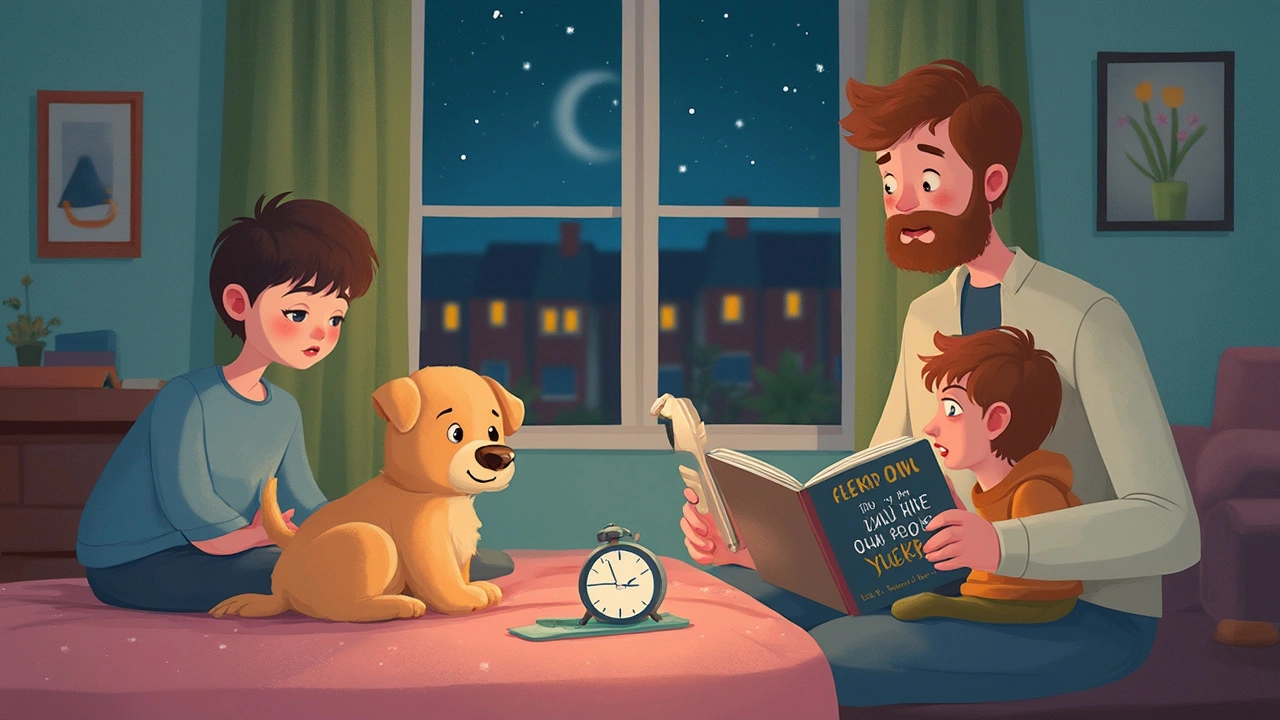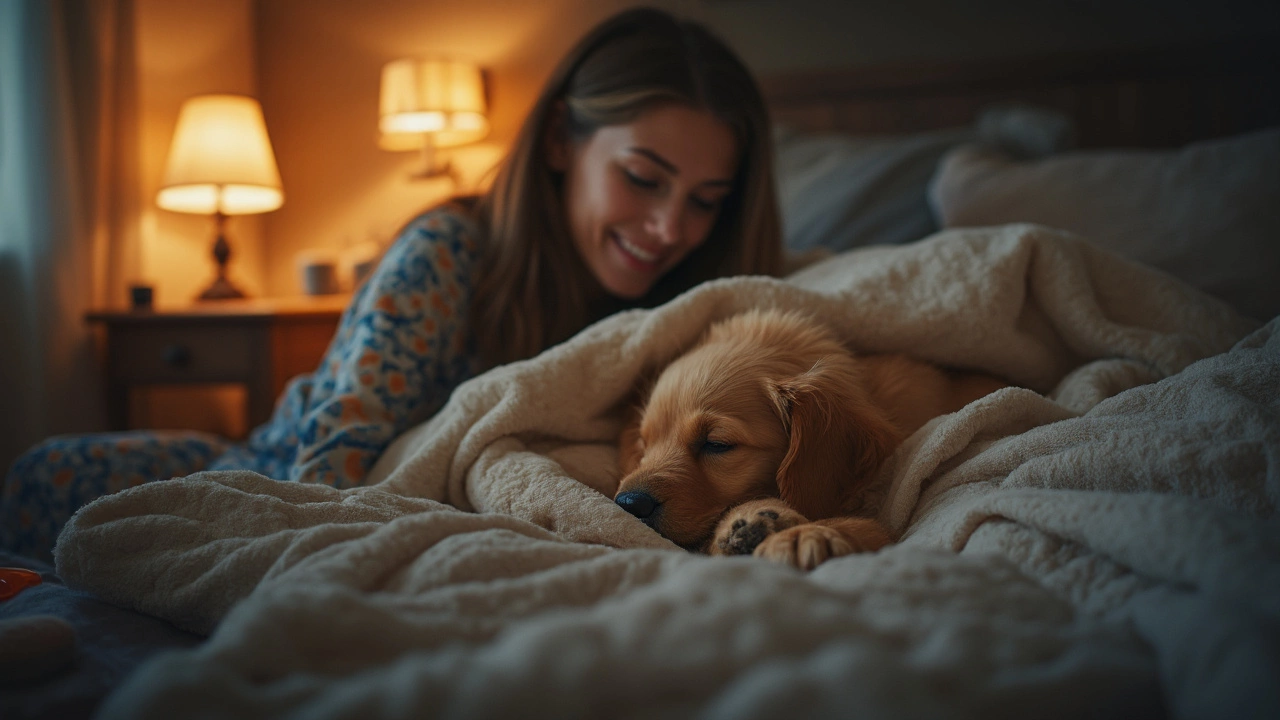If you’re running on fumes because your 8 week old puppy keeps waking you up all night, you’re not the only one. At this age, most puppies can’t sleep through the night without a bathroom break. Their bladders are tiny—think of a newborn baby, but with fur and sharper teeth. Expect one or two wake-up calls during the night for at least a few weeks.
Wondering if something’s wrong because your pup whimpers at 2 a.m.? Don’t stress. Puppies this young just aren’t built for marathon sleep yet. If you plan for it, you’ll save yourself a lot of frustration. And there are ways to make those short stretches of sleep a little bit longer—for you and your pup.
- How Long Can 8 Week Old Puppies Hold It?
- Setting Up Nighttime for Puppy Success
- Managing Midnight Wake-Ups
- Getting More Rest (for Both of You)
How Long Can 8 Week Old Puppies Hold It?
If you’re hoping your puppy can power through the night without a bathroom break, here’s the real scoop—you’re likely out of luck. At just 8 weeks old, most puppies can only hold their bladder for about 2 to 4 hours, tops. Their bodies just aren’t developed enough yet. This means even with the best routine, you’ll probably be heading outside at least once overnight.
There’s a simple formula that helps: take your puppy’s age in months and add one. So for an 8 week old (which is two months), you’re looking at maybe three hours before nature calls. It’s not just about potty training—it’s about what their little bodies can actually handle. Holding it too long isn’t healthy, and can even lead to accidents or bladder issues.
Here’s a quick breakdown of what to expect with 8 week old puppy sleep and potty needs:
- 2-4 hours is a typical max stretch between potty breaks at this age.
- Most pups need at least 1-2 overnight trips outside.
- Some smaller breeds have even less bladder capacity and may go more often.
If you’re consistently finding puddles in the crate or on the floor, it’s a signal your pup just can’t wait that long. Don’t punish them—just adjust the schedule. This is totally normal and not a sign of “bad behavior.” Their bodies will grow, and those stretches will get longer soon enough. Hang in there—every few weeks you’ll notice steady progress.
Setting Up Nighttime for Puppy Success
Getting an 8 week old puppy to settle at night isn’t luck—it comes down to a good setup. Puppies this age don’t understand the difference between night and day, so you need to guide them. Your aim is to help them feel secure and keep things calm so everyone gets a bit more sleep.
- Location matters: Put your puppy’s crate or bed somewhere close to where you sleep, at least for the first week or two. Being nearby helps your pup feel safe and less likely to freak out.
- Crate training helps: Crates are not puppy jails. When used right, crates give puppies a den-like, cozy space that feels safe. Make sure the crate is just big enough for your pup to stand up, turn around, and lie down. Any bigger, and accidents are more likely.
- Easy access to the door: At this age, your puppy will need to go out in the middle of the night. Keep slippers and a leash handy for those fast bathroom breaks so you aren’t fumbling around at 3 a.m.
- Blanket, not a pillow: Put a soft blanket or towel (not a pillow) in the crate. Bonus points if the blanket smells like the pup’s littermates or the breeder’s home to make the transition less scary.
- White noise is your friend: A small fan or white noise machine can help muffle weird house sounds that might startle a nervous pup.
Want your puppy to wind down before bed? Set a predictable routine. Playtime and a bathroom trip right before bedtime can help burn energy and empty their bladder.
| Step | Why It Matters |
|---|---|
| Short last play session (30 min before bed) | Helps your puppy get tired out |
| Final bathroom break (right before sleep) | Reduces late-night accidents |
| Quiet cuddle or calming activity | Signals it's time to settle down |
| Consistent bedtime | Teaches a reliable sleep pattern |
If you have kids like I do, remind them not to get the puppy excited again after you’ve started the bedtime routine. Too much chaos late at night and you’ll be back at square one. Stick to this setup every night and your puppy will soon catch on that nighttime means sleep, not play.

Managing Midnight Wake-Ups
There’s nothing great about stumbling out of bed at 3 a.m., but with an 8 week old puppy, these wake-ups are pretty much part of the deal. At this age, puppies usually need a bathroom break every 2-4 hours at night. It’s not naughty behavior or a sign you’re doing something wrong—it’s just biology. Statistics from most vet sources show puppies can only hold their bladder about one hour per month of age, so most 8 week olds (2 months) need to go every 2 hours or so.
| Puppy Age | Typical Nighttime Bladder Capacity |
|---|---|
| 8 weeks | 2-3 hours |
| 12 weeks | 3-4 hours |
| 16 weeks | 4-6 hours |
When your puppy cries at night, act fast but keep things low-key. Here’s how to turn "he needs to go" into a quick pit stop, not party time:
- Try not to make eye contact or talk a lot. Take your pup out quietly, let them do their business, and go right back to bed. No playing, no extra treats, keep it boring.
- Use the same door and spot each time. Puppies learn routines fast. The more predictable you are, the easier it is for them to understand night is for sleeping.
- If you’re crate training, resist the urge to let them out just for whining—wait for a real bathroom break. But don’t ignore them completely; a true need to pee won’t go away by itself.
If you’re consistent, most puppies start waking less often by 10-12 weeks. But don’t be hard on yourself (or your puppy) if you’re still up during the night for a bit longer. Even the best-trained pups slip up sometimes, especially if they drank more water in the evening or had a wild play session just before bed.
If the nights are feeling brutal, remember the keyword: 8 week old puppy. This exhausting phase won’t last. It’s a short-term price for great habits down the line.
Getting More Rest (for Both of You)
Let’s be real—nobody dreams of waking up every two hours for a bathroom dash with a puppy. But there are real, doable ways to help everyone get a bit more sleep while still meeting your little guy’s needs. The big trick is setting up clear routines and managing your own expectations. Puppies need time to mature before they can snooze like grown dogs.
First, keep bedtime and wake-up time consistent. A puppy’s body clock is just starting to form, and predictability makes things easier. Try a soothing wind-down: take your pup for a potty break right before bed, dim the lights, and keep voices calm.
Food and water are key factors. Stop feeding dinner about three hours before bedtime, and pick up the water bowl an hour before sleep. This isn’t mean—it just helps your puppy go longer before needing to pee. According to the American Kennel Club, most 8 week old puppies can hold their bladder for about 3-4 hours at night, max. That’s not much, but every little bit helps.
| Puppy Age | Typical Nighttime Bladder Capacity |
|---|---|
| 8 weeks | 3-4 hours |
| 12 weeks | 4-5 hours |
| 16 weeks | 6-7 hours |
If your puppy is crated, make the crate cozy but not too big—just enough for standing, turning, and lying down. If there’s too much space, your puppy might sneak off to pee in a corner. Toss in a blanket that smells like you and a safe chew toy. Even puppies like a comfort item.
For extra rest, try these simple steps:
- Keep nighttime potty trips boring—no play, no snacks, just potty and straight back to bed.
- Don’t scold for accidents; just clean up and move on. Anxiety = more restless nights.
- If you’re a super-light sleeper, set an alarm 10 minutes before your pup’s usual wake-up time. You’ll beat the whining and make bathroom breaks smoother.
- If possible, nap when your puppy naps during the day. (Yes, it sounds impossible with kids like Darcy, but every minute helps!)
Lastly, remember: an 8 week old puppy is a baby with a huge learning curve ahead. The rough nights do pass—usually by 12 to 16 weeks, you’ll be sleeping a lot better. Stick with the basics, love your pup through the chaos, and pretty soon, everyone in the house will get more shut-eye.
